FESTIVALPROGRAM BLOG
EXCERPTS IN GERMANSIMPLICITY - the art of complexity - ARS ELECTRONICA 2006 - Festival für Kunst, Technologie und Gesellschaft - Linz, Do 31. August – Di 5. September
5
Aug
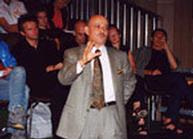 © Sabine Starmayr
© Sabine Starmayr
Jason Kottke (US) is a well-known American blogger and former Webdesigner. He created the enormously popular Silkscreen font that is widely used in the field of Web design. In March 1998, Kottke launched his blog that has gone on to become one of the highest-ranked personal sites in the blogging ecosystem.
Gary Chang (CN) founded his company EDGE in 1994. His commercial commissions include clubhouse, retail space, hotel, restaurant, office, yacht and aircraft interiors as well as product designs. The Suitcase House at the Commune by the GreatWall (a luxury hotel in China), the Kung-Fu Teaset for Alessi, and his own apartment in Hong Kong are his
best-known design projects.
Olga Goriunova (RU) is an artist, art scholar, co-organizer of the
Read_Me Festival and co-founder of the runme.org website.
Eric Yeatman (US) has been a member of the academic staff of the Imperial College in London since 1989. He is currently professor of microengineering and assistant director of the college’s research group in that field. He has been manager of two large EU research collaborations, and principal or co-investigator on 12 research council and several industry-supported projects, and has published more that 60 scholarly papers on materials for integrated optics as well as on
microfabrication and radio frequency MEMS.
Fr/Fri
1. 9.
15:00 - 18:00
Brucknerhaus,Mittlerer Saal
Simplicity Symposium II
15:00 - 15:15 Intro John Maeda
15:15 - 15:45 Jason Kottke
15:45 - 16:15 Gary Chang
16:15 - 16:30 Pause
16:30 - 17:00 Olga Goriunova
17:00 - 17:30 Eric Yeatman
17:30 - 18:00 Diskussion
Moderator: John Maeda
5
Aug
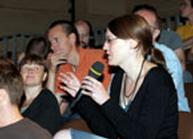 © rubra
© rubra
Sam Hecht (UK) studied industrial design at Central St. Martin’s College of Arts and Design and received his degree in industrial design from the Royal College of Art in London. He has been the recipient of numerous prizes, and his list of clients includes Muji.
Walter Bender (US) heads the Gray Matters working group that deals with technology's impact on an increasingly elderly population. He is member of the MIT Media Lab’s SIMPLICITY Project, Things That Think and the Digital Life Consortium. Bender is currently president of the software and content division of One Laptop Per Child, a non-profit organization that is developing a technology designed to revolutionize how the world’s children are educated.
Paola Antonelli (US) is curator of the architecture and design department at the Museum of Modern Art (MoMA) in New York. Her “Mutant Materials in Contemporary Design” exhibition (1995) garnered high praise. Her latest offering “SAFE: Design Takes on Risk” (2005) deals with objects that aim to protect our bodies and souls.
Hugh Herr (US) is Associate Professor of Media Arts and Sciences at the MIT Media Lab. His research activities concentrate on ways in which principles derived from muscle mechanics, neuronal control and human biomechanics can be applied to the development of biomimetic robots and rehab devices.
Fr/Fri
1. 9.
10:30 - 13:30
Brucknerhaus,Mittlerer Saal
Simplicity Symposium I
10:30 - 10:45 Intro John Maeda
10:45 - 11:15 Sam Hecht
11:15 - 11:45 Walter Bender
11:45 - 12:00 Pause
12:00 - 12:30 Paola Antonelli
12:30 - 13:00 Hugh Herr
13:00 - 13:30 Diskussion
Moderator: John Maeda
4
Aug
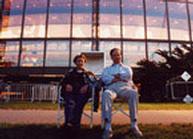 © Sabine Starmayr
© Sabine Starmayr
Music for a landscape-for the Danube and the riverside park adjacent to the Brucknerhaus-is the leitmotif of this year's Klangpark.
A high-performance loudspeaker system delivering superb sound reproduction will be set up to provide an optimal listening experience throughout the alfresco concert venue.
The piece selected for the 2006 Klangpark is Robert Ashley's “Music with Roots in the Aether,” an exciting approach to staging a musical project and combining it with visual forms of expression.
4
Aug
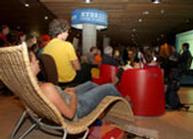 © rubra
© rubra
The make-it-simple workshops will highlight this year's e-lobby kitchen. Concepts and results that emerge from the workshops will be presented and thrashed out.
Fr/Fri 1.9. 12:00 - 14:00:
Andreas Hirsch will chair the follow-up discussion after the first session of the Simplicity Symposium.
Mo/Mon 4. 9. 12:00 - 14:00
Günter Reisinger will present the Ludwig Boltzmann Institute’s netzpioniere.at” project. Plus: spontaneous elaborations.
Di/Tue 5. 9. 18:00 - 19:00
Making of Strawinsky, Susanne Scheel, Horst Hörtner, Klaus Obermayer
electrolobby kitchen
3
Aug
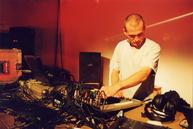 © Sabine Starmayr
© Sabine Starmayr
decker/reiter work on various soundscape ordering patterns behind turntables, computer and synthesizer.
They’ll be followed by staalplaat and a live performance of a mono erosive surround-sound installation entitled “Yokomono” that was singled out for recognition with an Honorary Mention in the 2006 Prix Ars Electronica's Digital Musics category.
DJ ddkern’s extraordinary stylistic mix will conclude the evening with a bang.
3
Aug
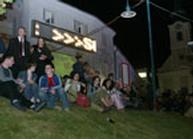 © rubra
© rubra
At day's end, there's nothing like Quarter Nightline in the Stadtwerkstatt to wind things up on a high note.
Fr/Fri 1. 9.
Mr. Scheutz Thomas Scheutz (strom)
Daeque Martin Riedler (strom)
Joachim Knoll (strom)
Trash Kid Martin Huber (saal)
Emix Markus König (saal)
NDL Andreas Liest (saal)
Fino Felix Vierlinger (saal)
Ufuk Ufuk Serbest (saal)
Janosch Janosch Locomono (saal)
Sa/Sat 2. 9.
Martin Klein (saal)
Lena Klein (saal)
Klemens Pisl (strom)
So/Sun 3. 9.
The Dicer Markus Decker (strom)
Herbst Richard Herbst (strom)
Stefan Kushima (strom)
Uwe Walkner (saal)
Mo/Mon 4. 9.
wird nachgesendet
Di/Tue 5. 9.
Guy RabbitWolfgang Ofner (saal)
Metadrain Death Mechanism Johannes Pöll (saal)
Animal Mother Michael Huber (saal)
Ras Rugged Felix schager (strom)
la Oona Valarie Schager (strom)
STWST (AT)
2
Aug
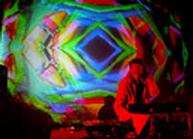 © Pascal Maresch
© Pascal Maresch
In conjunction with the 2006 Ars Electronica’s Campus exhibition, the “Grand Cafe zum Rothen Krebsen,” the Institute for Expanded Art’s event space, will provide an ideal setting for sound- and performance-based projects.
The exhibit will showcase works from the Media Lab Helsinki as well as by regional artists and groups. Rounding things out will be an all-evening Finnish-Austrian DJ set, simulations of the northern lights, and live acts.
2
Aug
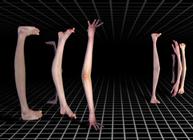 © Klaus Obermayer
© Klaus Obermayer
Following the successful virtual staging of Richard Wagner’s “Das Rheingold” (2004) and Gustav Mahler’s Symphony Nr. 2 in C Minor (2006), the Ars Electronica Futurelab and the Brucknerfest now carry on their series of collaborative efforts with a performance of “Le Sacre du Printemps” (The Rite of Spring).
In “The Making of Stravinsky,” the audience will attend a public rehearsal and experience how the Bruckner Orchestra conducted by Dennis Russell Davies and Karen Kamensek, dancer Julia Mach and the computer artists prepare for the performance of Igor Stravinsky's “Le Sacre du Printemps” together with the accompanying visuals.What's special about this performanceis its interactive combination of orchestral music and computer visualizations.
Susanne Scheel, curator and organizer of the VJ contest at the International Video Festival in Bochum, Germany, will briefly discuss the history and modern forms of synaesthesia. Horst Hörtner of the Ars Electronica Futurelab and media artist Klaus Obermayer will elaborate on the project’stechnical and artistic aspects.
On September 10, 2006 at 8 PM,“Le Sacre du Printemps” will be performed as part of the opening concert of the 2006 Brucknerfest in combination with the classical Klangwolke conducted by Dennis Russell Davies and Karen Kamensek.
1
Aug
Conferences | posted by Maria Hieslmayr | at 13:15:00
Simplicity Symposium curated by John Maeda (US)
 ©
©
A simple life. Mankind’s constant search for simplicity is unavoidably connected with the boredom that rears its ugly head as soon as this wish is fulfilled and complexity once again begins flaunting its charms. This dialectic of simplicity and complexity has harried human beings in all areas of life.
Thus, in order to even be able to deal with the world of the computer, we have to just accept adegree of complexity that we are unable to definitively grasp.
A stellar lineup of speakers will elaborate on the many different aspects of simplicity - and complexity no doubt as well. How do we live? How will we be living? What do we fear? What do we yearn for? Together, we'll organize, reduce and synthesize a catalog of knowledge upon this podium of trust, and hope that, as a result, everyone taking part will be able to make his/her own choice of a path to simplicity or complexity.
This fall, John Maeda will be publishing a book that deals with “The Ten Laws of Simplicity.” For two years in Maeda’s simplicity blog (http://weblogs.media.mit.edu/SIMPLICITY), the contents of this publication have been at the focal point of a public discussion that will now flow into the Simplicity Symposium, whereby one area of particular emphasis will no doubt be the issue of appropriate design strategies to allow simplicity and complexity to converge.
Fr/Fri
1. 9.
10:30 - 13:30
Brucknerhaus,Mittlerer Saal
Simplicity Symposium I
Fr/Fri
1. 9.
15:00 - 18:00
Brucknerhaus,Mittlerer Saal
Simplicity Symposium II
1
Aug
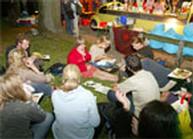 © rubra
© rubra
The object of this game is to temporarily lay claim to a public space and impart a design to it in a very unconventional way. The players-all 100-200 of them-are issued little flags of different colors; they then form a square on a slope of Schloßberg, a hill overlooking Linz.
Pedestrians on the nearby Nibelungen Bridge or in the Urfahr neighborhood are invited to call in requests for patterns they'd like to see on Schloßberg. The players on Schloßberg then jointly attempt to visually implement the requested image,choosing the appropriate colors and waving the corresponding flags.
To pre-register as a player: spiel@afo.at or 0664/954 96 57.
Afterwards, all players are invited to partake of a buffet!
Sonja Meller (AT)
31
Jul
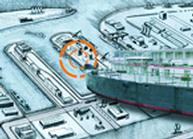 © Ars Electronica Center
© Ars Electronica Center
Increasing complexity evokes a yearning on the part of many people for a simpler life, one that is more down-to-earth and rooted to one’s native soil. People long for simplicity in the traditional sense, and the opening event reflects this longing.
Linz's industrial harbor and an old-fashioned paddle steamer form a mutually complementary, ready-made backdrop for the climax of the first day's activities and the big kick-off of the Festival week. Performances, interventions, music and visualizations ring in the Ars Electronica Festival.
We'll also be offering festivalgoers the opportunity to soak up the nocturnal atmosphere of the Linz harbor during an approximately halfhour cruise aboard the Eduard.
Abfahrtzeiten/Departures: 20:30; 21:30, 23:30; 24:30
28
Jul
Campus | posted by Maria Hieslmayr | at 11:21:00
Tangible, Audible, Playable, Wearable: Interface Culture Student Works at Ars Electronica 2006
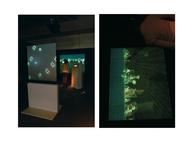 © Sommerer
© Sommerer
5. Cluster Robotic Interfaces:
In a special course by Time’s Up (Tim Boykett and Marc9), students get an introduction to the basics of artistic robotics and present a performance by their robots.
Projects:
“It’s Alive” – Robotic Performance von Andreas Zingerle (auch Metakom Projekt), Tobias Zucali, Harald Moser, Timm-Oliver Wilks, Bernhard Pusch, Mika Satomi, Hannah Perner-Wilson, Gustavo Morant Garcia
This exhibition of student works thus documents how interactive technologies are coming into increasing use in creative applications and hybrid art projects, and, via innovative recombination of technology and art, are giving rise to interesting prototypes at the nexus of media art, design research and application.
Laurent Mignonneau (FR)
Christa Sommerer (AT)
27
Jul
Campus | posted by Maria Hieslmayr | at 16:34:00
Tangible, Audible, Playable, Wearable: Interface Culture Student Works at Ars Electronica 2006
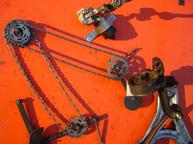 © Sommerer
© Sommerer
4. Cluster Intelligent Environments, Tangible Interfaces and Auditory Interfaces:
This field (teachers: Martin Kaltenbrunner, Andreas Weixler and Christopher Lindinger) has given rise to projects such as “iShaker” which makes it possible to generate beats and sounds with three iPods, “Atem Raum,” an interactive environment that reacts to breathing, “Title: Shape, Color & Sound,” a tangible interface that combines the worlds of Ittens and Schönberg, and “Scream Point,” an ironic work about interactive photography.
Projects:
“AtemRaum” - Thomas Wagner, Andreas Zingerle
“ Shape, Color & Sound” - Penesta Dika, Tomor Elezkurtaj.
„serial_killer“ – Timm-Oliver Wilks
„Kein Gedankenloser Transport“ - Hannah Perner-Wilson
“Scream Point” - Sebastian Dietrich, Harald Moser
“iShaker” – iShaker, Gustavo Morant Garcia, Franziska Parschau
Laurent Mignonneau (FR)
Christa Sommerer (AT)
27
Jul
Campus | posted by Maria Hieslmayr | at 09:15:00
Tangible, Audible, Playable, Wearable: Interface Culture Student Works at Ars Electronica 2006
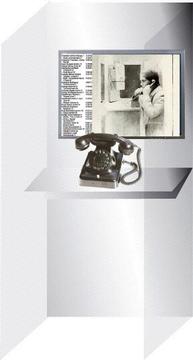 © Sommerer
© Sommerer
3. Cluster Fashionable Technology:
Additional areas of emphasis of the Interface Culture program are fashionable technologies (taught by Sabine Seymour) and the development of sensor technologies (taught by Laurent Mignonneau). In a project entitled *No more under cover*, for instance, overdue library books gradually change color. Other works include “Enlightened Collection” and “Clothing that arranges the body.”
Projects:
“No more under cover” - Angela-Maria Holzer, Harald Moser
“Enlightened Collection” – Irmgard Falkinger-Reiter
“Clothing that arrange the body”- Hannah Perner-Wilson
Laurent Mignonneau (FR)
Christa Sommerer (AT)
26
Jul
Campus | posted by Maria Hieslmayr | at 17:07:00
Tangible, Audible, Playable, Wearable: Interface Culture Student Works at Ars Electronica 2006
 © Sommerer
© Sommerer
2. Cluster Interactive Artificial Life Projects:
Programming courses (taught by Christine Sugrue, Robert Praxmarer and Friedrich Kirschner) familiarize students with generative processes. The results include several interactive installations that deal with the ‘game of life’ theme and computer-generated nature: “Life,” “Nature,” “ebenda no.1 - coinciding entities” and “Mikrokosmos.”
Projects:
“Life()” – Mika Satomi
“ebenda no.1 - coinciding entities” – Cassandra Mehlhorn
“Nature” - Timm-OliverWilks, Harald Moser, Thorsten Kiesl, David Purviance
“COWSinTHEfield” - Hannah Perner-Wilson
“Mikrokosmos”- Susanne Posegga
Laurent Mignonneau (FR)
Christa Sommerer (AT)
26
Jul
Campus | posted by Maria Hieslmayr | at 09:22:00
Tangible, Audible, Playable, Wearable: Interface Culture Student Works at Ars Electronica 2006
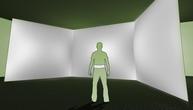 © Sommerer
© Sommerer
A year after its establishment, the Interface Culture masters program (registration info: http://www.interface.ufg.ac.at/) was already able to present works by its students at the 2005 Ars Electronica Festival. This exhibition included examples of interactive art, tangible interfaces, intuitive instruments for playing and composing music, acoustic and object-based interfaces, CAVE applications and interactive games. This year as well, we’ll have the opportunity to show projects by Interface Culture students at the 2006 Ars Electronica. These projects can be divided more or less into five thematic clusters.
1. Cluster Interactive Media Archeology:
These works deal with media archeology (taught by Gebhart Sengmüller). For example, the interactive installation “re:call phone” shows how new sensor technology and a picture screen can be added to a telephone from the 1920s to make it an interactive tool that lets users experience the history of telecommunications in a playful way. “The Digital Barrel-Organ” combines an old barrel-organ with digital MP3 sounds to deliver a satiric commentary on the current music scene. Other works are “FLOP,” “The Knight of the Coconut” and “Metascope.”
Projects:
“ re:call phone” - Doris Diensthuber, Christan Meixner
“Die digitale Drehorgel” – Bernhard Pusch
“FLOP” – Christina Heidecker
“Der Ritter von der Kokosnuss” – Taife Smetschka
“sCANNED OBJECTs” - Irmgard Falkinger-Reiter
“ Metaskop” - Bernhard Schorner
Laurent Mignonneau (FR)
Christa Sommerer (AT)
25
Jul
Conferences | posted by Maria Hieslmayr | at 15:57:00
Forum III – Computer Animation / Visual Effects
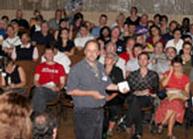 © rubra
© rubra
The prize winners in the "Computer Animation / Visual Effects" category:
Jan Bitzer, Ilija Brunck, Tom Weber/ Filmakademie Baden Württemberg
DE) - 458nm - Golden Nica
Daniel Nocke (DE) - Kein Platz für Gerold
Jun Awazu (JP) - NEGADON: The Monster from Mars
Participants of the Forum:
Mark Dippé (US), Juryvertretung
Jan Bitzer, Ilija Brunck, Tom Weber (DE)
Daniel Nocke (DE)
Jun Awazu (JP)
25
Jul
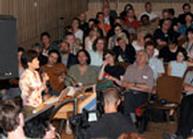 © rubra
© rubra
The prize winners in the "Digital Musics"category:
Eliane Radigue (FR) - L’île re-sonante – Golden Nica
Joe Colley (US) - psychic stress soundtracks
Kaffe Matthews (UK) / Annette Works (UK) - Sonic Bed_London
Participants of the Forum:
Rob Young (UK), Juryvertretung
Eliane Radigue (FR)
Joe Colley (US)
Kaffee Matthews (UK)
24
Jul
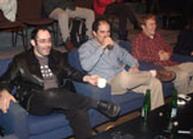 © Sabine Starmayr
© Sabine Starmayr
The prize winners in the "Interactive Art" category:
Paul DeMarinis (US) - The Messenger - Golden Nica
Zachary Lieberman (US) - drawn
Evan Roth, James Powderly and the agents of the G.R.L.
(Eyebeam OpenLab, US) - Graffiti Research Lab
Participants of the Forum:
Karin Ohlenschläger (ES), Juryvertretung
Erkki Huhtamo (US / FI)
Zachary Lieberman (US)
Evan Roth, James Powderly (US)
11:45 – 12:30 Artist Speech: John Maeda
24
Jul
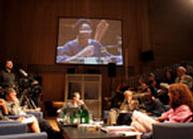 © rubra
© rubra
A themed collaboration of Ars Electronica and Ö1 matrix, curated by Sonja Bettel and Ina Zwerger
Forum IV - Digital Communities
Access to all areas
Monday, 4.9.2006: 10:30 AM - 01:30 PM
Communications technologies can provide access to information, expand the latitude of human action and bring people together. But they can also act as a hindrance. Incomprehensible menus, unergonomic keyboards, tiny typefaces, cryptic functions, the lack of platform diversity—the list of obstacles that make using technology more difficult or even impossible is a long one. How do the Internet and other technologies have to be set up so that all people—regardless of their physical and technical endowments—are able to enjoy unrestricted use? What’s preventing developers from implementing findings about usability and barrier-free design? Which new technologies can, in spite of their complexity—or, perhaps, precisely because of it—simplify everyday life?
Winners in the Prix Ars Electronica’s Digital Communities category present their projects and discuss accessibility and usability with experts in the field and those who are concerned with or disadvantaged by the absence of these qualities.
Moderation: Ina Zwerger, Sonja Bettel (Ö1 Matrix)
In cooperation with Ö1 Matrix
Antoni Abad - canal*ACCESSIBLE - Golden Nica http://www.zexe.net/barcelona
Codecheck.ch - Codecheck
Silvana Lemos de Almeida - PROYECTO CYBERELA – RADIO TELECENTROS http://www.cemina.org.br
Präsentation:
Andreas Hirsch (AT)
Antoni Abad (ES)
Roman Bleichenbacher (CH)
Silvana Lemos de Almeida (BR)
With: Klaus Miesenberger (AT), Paul Lukowicz (AT), Manfred Tscheligi (AT), Michaela Braunreiter (AT), Antoni Abad (ES), Eva Wohlgemuth (AT)
Forum V – Net Vision
Monday, 4.9.2006: 3 PM - 5 PM
The prize winners in the "Net Vision" category:
exonemo (JP) - The Road Movie - Golden Nica
Michael Stadler (AT) - Tsunami Harddisk Detector
Wayne Clements (UK) - un_wiki
Präsentation:
Eva Wohlgemuth (Jury)
Exonemo (JP)
Michael Stadler (AT)
Wayne Clements (UK)
Participants of the Forum:
Antoni Abad (ES)
Sonja Bettel (AT)
Roman Bleichenbacher (CH)
Michaela Braunreiter (AT)
Wayne Clements (UK)
Silvana Lemos de Almeida (BR)
exonemo (JP)
Paul Lukowicz (AT)
Klaus Miesenberger (AT)
Michael Stadler (AT)
Manfred Tscheligi (AT)
Eva Wohlgemuth
Ina Zwerger (AT)
Blog Authors:
Maria Hieslmayr Cornelia Sulzbacher Wolfgang Bednarzek Gerda Hinterreiter Didi Offenhuber Beta Lounge Artists David Cuartielles Sonja Meller StWSt denCity.net
Search:
Categories:
Conferences Animation Festival Events, Concerts & Performances Campus Exhibitions e-lobby Prix Ars Electronica
Recent Posts:
Photographs of the 2006 Festival Media lab thanks! Ars Electronica Center FM4 Live from Ars Electronica in Linz
Archives:
Posts 80 - 60 Posts 60 - 40 Posts 40 - 20 Posts 20 - 0


